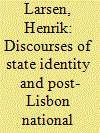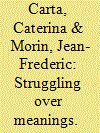|
|
|
Sort Order |
|
|
|
Items / Page
|
|
|
|
|
|
|
| Srl | Item |
| 1 |
ID:
134255


|
|
|
|
|
| Summary/Abstract |
This article discusses the potential of Critical Discourse Analysis (CDA) for the study of EU foreign policy and argues that CDA can provide a systematic way of studying discourses on EU foreign policy through the refined linguistic and argumentative tools that it offers. The article first outlines the main theoretical premises of CDA and its one particular variant, the discourse-historical approach, and then presents a discussion on its analytical and methodological toolkit. After discussing the various ways in which EU foreign policy texts can be subject to CDA, the article concludes with the theoretical challenges posed by CDA, particularly regarding its relationship with poststructuralist approaches to foreign policy.
|
|
|
|
|
|
|
|
|
|
|
|
|
|
|
|
| 2 |
ID:
134256


|
|
|
|
|
| Summary/Abstract |
The political system of the EU and its member states is frequently seen as post-Westphalian within constructivist-inspired research. This is based on the view that political authority and legitimacy are to be found both at the EU level and the national level with no clear borders between them. The question raised in this article is how the member states conceive of themselves as foreign policy actors in this situation where they are both politically embedded in EU foreign policy structures and, in most cases, formally able to act outside the EU structures in the field of foreign policy. The overall argument is that a pertinent answer to this question can be provided by looking at how (or whether) state identity is articulated in relation to the EU. The paper first presents theoretical considerations relating to discursive articulations of state identity in an EU context. The relevance of these discursive articulations is then illustrated through the empirical example of Danish articulations of actorness prior to and post Lisbon. It is shown that the articulation of national actorness in relation to the EU varied across the different areas of foreign policy before and after Lisbon. A research agenda that flows from these considerations is outlined.
|
|
|
|
|
|
|
|
|
|
|
|
|
|
|
|
| 3 |
ID:
134535


|
|
|
|
|
| Summary/Abstract |
At the time of writing, representatives from Iran and the E3/EU+3 are trying to work out an agreement that will guarantee that Iran’s controversial nuclear programme, widely suspected of having a military purpose, serves only peaceful ends. As the negotiations enter their most crucial phase, the time is ripe to attempt an assessment of the role played by the only actor, besides Iran, that has been on stage since it all began over ten years ago: Europe. Throughout this long drama, Europe’s performance has had some brilliant moments. Yet the quality of its acting has decreased as a new protagonist, the US, has come on stage. Overall, the Europeans’ record is positive, albeit not entirely spotless.
|
|
|
|
|
|
|
|
|
|
|
|
|
|
|
|
| 4 |
ID:
135296


|
|
|
|
|
| Summary/Abstract |
When Catherine Ashton took up office as High Representative of the Union for Foreign Affairs and Security Policy (HR), she met with high expectations – and much disappointment. As the first incumbent of the remodelled position, she had the chance to leave a legacy for her successor, but faced an unclear job description. What was the HR’s role in EU foreign policy? It is argued that the HR acted as a diplomat and manager of EU external action, while her role performance in co-leadership and brokering were less successful. Role expectations and performance entered a fragile equilibrium at the end of Ashton’s tenure. However, the future role of the HR might shift more towards a co-leader of EU foreign policy.
|
|
|
|
|
|
|
|
|
|
|
|
|
|
|
|
| 5 |
ID:
134253


|
|
|
|
|
| Summary/Abstract |
This article discusses the relevance of discourse in the analysis of EU foreign policy. Instead of using discourse as a structure, the discursive struggles in meaning production are emphasised. The article argues that the literature trying to make a contribution to the explanation of EU foreign policy has so far overemphasised the positive function of discourses in influencing policies in their substance. In contrast, the article focuses on the delimiting function of discourses in providing the boundaries of the kinds of policies which can be legitimately pursued. From this point of view, important discursive struggles take place exactly about these limits, and it is only through the setting of these limits that identities and norms are provided with clearer meanings. The article illustrates this framework by focusing on the debate about normative power Europe. It argues that an important aspect of this debate which has been missing from the literature so far is that it is indeed engaging in a struggle over what is acceptable as a policy of a normative power and is what not, and that it is therefore engaged in setting the limits of legitimate EU foreign policy.
|
|
|
|
|
|
|
|
|
|
|
|
|
|
|
|
| 6 |
ID:
134251


|
|
|
|
|
| Summary/Abstract |
The first section of this article arranges the four theoretical approaches and methods presented in the special issues – namely interpretative constructivism, post-structuralism, discursive institutionalism and critical discourse analysis – along two dimensions: (a) the role of discourse in the constitution of the world, depending on whether approaches perceive social structure as being constitutive of or constituted by discourse; and (b) interpretation of the weight of material and ideational elements in discourses. This model helps to make sense of the profound theoretical diversity that characterises analytical approaches to international relations discourse. The second section tackles the question of ‘who does the speaking’. It identifies the different voices that converge in the EU’s international choir and problematises the discursive environment that forges international discourses through the theoretical lenses of selected approaches. In the last section, the contributions to this special issue are presented.
|
|
|
|
|
|
|
|
|
|
|
|
|
|
|
|
| 7 |
ID:
134540


|
|
|
|
|
| Summary/Abstract |
The EU’s response to the Arab Spring is seen as one of its biggest missed opportunities. It has been unable to bring together its different tools of foreign, development and security policy into a strategic joined-up approach. The interconnectedness of the socio-economic and political demands of the popular uprisings across the north of Africa represented a unique opportunity to implement such a joined-up approach. The EU’s ambitious rhetoric and pledges to promote ‘deep democracy’ have not been matched at policy level in the fields of money, market or mobility. Whilst certain member states have sought to overcome the different operating logics of the development, diplomatic and security communities in their regional Arab Partnership programmes, a number of structural and circumstantial factors limit the effectiveness of these attempts, at both the EU and member state level.
|
|
|
|
|
|
|
|
|
|
|
|
|
|
|
|
| 8 |
ID:
134254


|
|
|
|
|
| Summary/Abstract |
This article looks at ways in which the EU’s institutional representatives and individual civil servants of the Commission and the European External Action Service frame their discourse on the EU’s international role and values. It proceeds as follows. Firstly, it introduces the data and methodology employed in Discourse Historical Analysis. Secondly, it presents a section to illustrate the metaphors that have been adopted to organise collected material. It identifies three main patterns of discourse-making and associates them with metaphors coming from the Western European literature tradition: two figures coming from Voltaire’s Candide – Candide and Pangloss – and a character from a Mozart opera, Don Giovanni. Finally, the article focuses on perceptions of the EU’s international actions and its core underlying values.
|
|
|
|
|
|
|
|
|
|
|
|
|
|
|
|
|
|
|
|
|